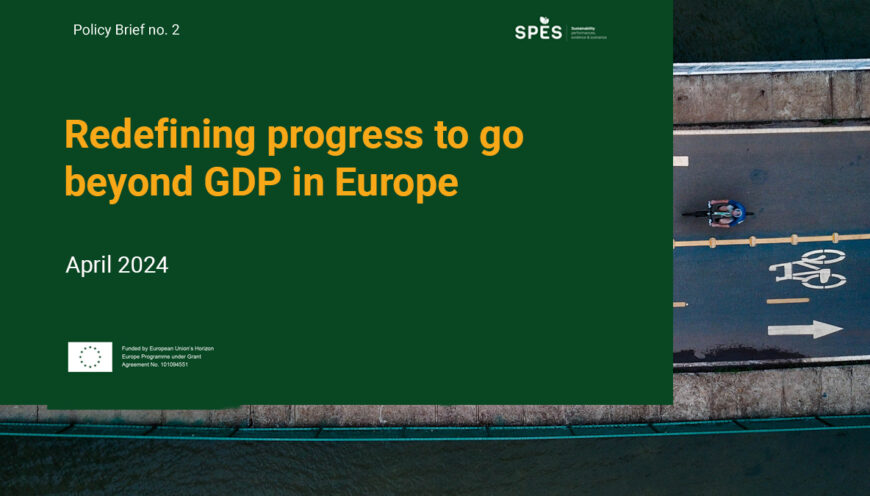Beyond-GDP is more than an upbeat slogan especially if we embrace a Sustainable Human Development Paradigm that points to the overarching goal of promoting sustainable and inclusive well-being. However, this is still hampered by the presence of political, institutional and technical barriers accruing from mainstream governance mechanisms, institutions, financing and policymaking, as well as vested interests, oriented, primarily, towards economic growth. Therefore, it is crucial to understand that the advancements of this new SHD narrative are characterized by an increasing level of contention by some of these actors.
Given the increasing global push to the beyond-GDP debate, it is essential to prioritize the alignment among different proposals by developing a clear and coherent framework and theory of change.
In other words, improving theoretical frameworks and technical capacities are a necessary but not sufficient condition. Rather, as a general argument, the SPES project suggests that development narratives, policy priorities and technical capacities must align before an appropriate SHD measurement framework can be adopted at global and European levels and used effectively in policymaking processes.
Policy Recommendations
1. Harnessing science policy interface to fight misinformation
In a period characterized by great political challenges, it becomes essential to use scientific knowledge in decision-making processes. Better utilization of science can enhance public trust in governments and their competencies, elucidate policy choices for the public, fight misinformation, and improve the support and implementation of adopted policies. Three main challenges emerge for getting the best available science
to decision-makers when it is needed and in a format that allows for its consideration.
These challenges include:
- creating better connections and relationships within and between national science-to-policy ecosystems,
- developing the professional skills needed at the science-policy interface, and
- strengthening good governance principles and processes in the use of science for policy.
Addressing these challenges is a collective task that necessitates a more robust and interconnected science for the policy ecosystem across Europe.
2. Strengthening a global collaboration to go beyond GDP
There is a need for a broad global alliance among the most relevant international organizations and supranational institutions, including the UN, the OECD, the European Union and the top experts to coordinate convergence efforts and make the final decisive step to go beyond GDP. Indeed, as academia and institutions increasingly seek alignment, akin to the historical evolution of GDP measurement, consensus on broader metrics becomes imperative. However, beyond agreeing on measurements, it calls for envisioning the new world we desire.
Overcoming the addiction to GDP requires a collective commitment to broader well-being and sustainability. A shared theoretical framework on Sustainable Human Development as a global reference point can facilitate dialogue, standardization, and mutual learning, fostering a coherent and meaningful approach to measuring societal progress. In this pursuit, the EU should seize the opportunity to harness the 2030 Agenda as a foundational stone of all its strategies and policies.
3. Refining simpler composite indicators for better policy insights
Composite indicators can contribute positively to the debate by informing and assisting decision-makers in monitoring and evaluation processes. Besides assessing multidimensional socio-economic phenomena, they allow cross-country comparisons and are accessible to the general public. However, the review of the composite indicators measuring SHD while accounting for transition performances shows they have limited capacities in capturing economic and social changes and, especially, assessing SHD. These shortcomings are closely tied to the methods and assumptions underlying their construction.
Especially when addressing politicians, researchers should acknowledge their limitations, fostering discussion to propose alternatives and improve their methodological design for better SHD measurement. It is therefore key to carefully evaluate whether simpler composite indicators can be adopted instead of more complex ones that aggregate information from many dimensions.
Moreover, changes in composite indicators should always be complemented with a comprehensive analysis of each component in order to make the public aware of what mechanisms drive SHD.
4. Placing geostatistics at the intersection of economic, social and environmental domains
Managing economic, social and environmental data together generates an unprecedented demand for statistical measures to embrace the complexity of interconnections at all levels. Adequate geographic disaggregation, which also allows for highlighting social and territorial inequalities, is a key component of national and international information demand, which needs due attention in current and future developments. The geostatistical approach is essential for promoting comparisons and the analysis of trends that cannot be developed only by considering aggregate data.
Spatial disaggregation is an indispensable dimension of the analysis for measuring and monitoring development equity and inclusiveness. The availability of indicators of high spatial detail is also an essential prerequisite for designing tailored policies that anticipate eventual inequalities. However, it is necessary to keep in mind that more disaggregated measures may come at the cost of higher measurement errors, making the indicators more erratic and less robust. For this reason, a range of expected statistical errors should be provided to avoid drawing conclusions about variations across time and space that are simply due to noisy measurements.
5. Enhancing National Statistical Offices to produce evidence on Sustainable Human Development
Statistics not only empowers people and decision-makers with a clear understanding of our collective progress but also sheds light on the challenges ahead and the resources required to overcome them. By providing a comprehensive picture of where we stand and where we aspire to be, Official Statistics stimulate informed discourse and enrich public debate. Therefore, it is essential to integrate this information into the political process to enable stakeholders to comprehensively weigh the costs, benefits, and trade-offs of different policy options.
Investing in robust monitoring systems (in line with the System of National Accounts) and therefore improving statistical capacity not only enhances accountability and transparency but also promotes evidence-based decision-making. Given the rapid escalation of multiple global crises, there is a need to focus on increasing comparability, timeliness and geographical coverage of data.
6. Translating research and science in the public discourse to facilitate civic engagement
Academia, statistical offices and research organizations should take on the responsibility of translating research work into a language that is accessible, yet still rigorous and scientific. To facilitate this, it is necessary to forge a strong alliance between research institutions and both new and traditional media. This partnership is essential to stimulate the production of research findings that are more usable and relevant to the public, especially on topics of significant public concern.
There are three practical steps for effective communication:
- simplified language making findings accessible to a non-specialist audience,
- effective use of data visualization bridging the gap between complex data and public comprehension,
- transparency, openness, and accessibility of new evidence and knowledge.
It is essential that the entire community, regardless of their level of education and skills, can discuss political issues in an informed manner. Increasing public understanding of economic, social, and environmental items can build trust and facilitate civic engagement in political decisions.
These Policy Recommendations are part of the second Policy Brief delivered by the SPES Consortium
The Policy Brief has been written by Francesco Ottaviani, ASviS; Camilla Sofia Grande, ASviS; Manlio Calzaroni, ASviS.
Contributors and peer reviewers:
Mario Biggeri, University of Florence; Laura de Bonfils, Social Platform; Paolo Brunori, London School of Economics and Political Science; Andrea Ferrannini, University of Florence; Albert Ferrari, European University
Institute; Adam Francescutto, University of Florence; András Gábos, TÁRKI; Orsolya Lelkes, TÁRKI; Amaia Palencia, London School of Economics and Political Science; Katja Reuter, Social Platform.




